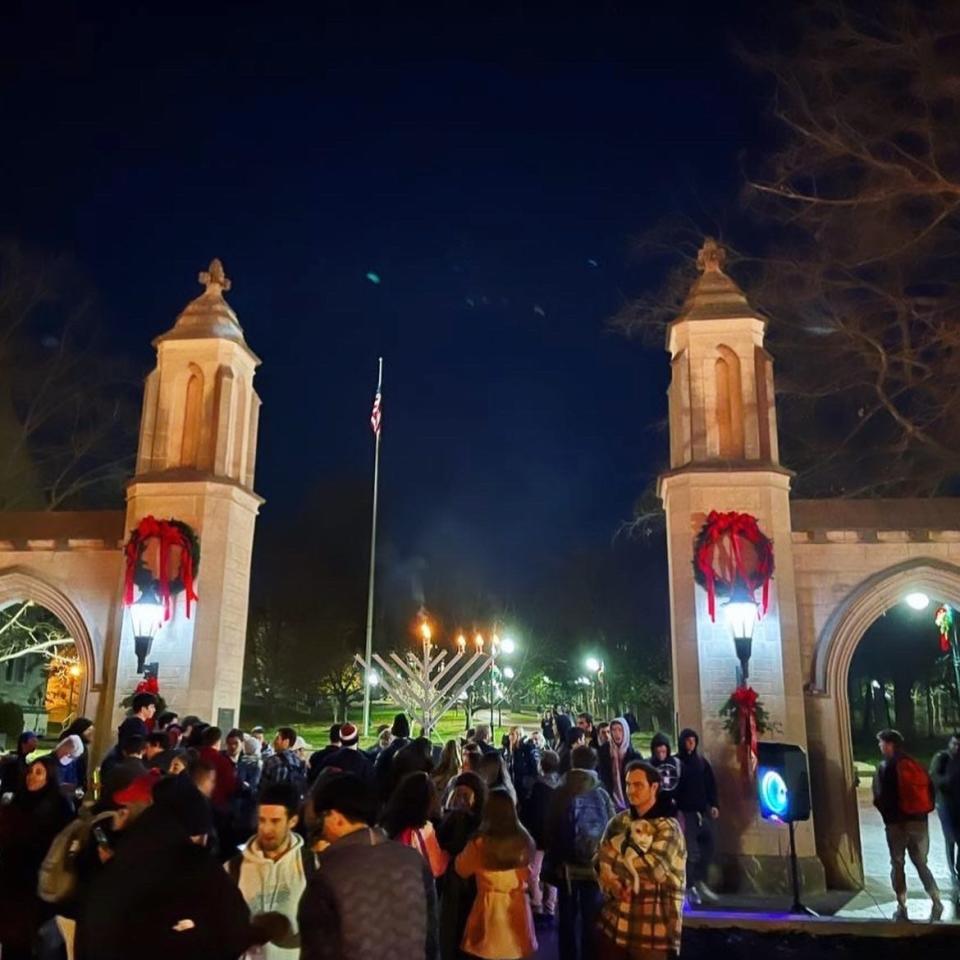Opinion: Why, as a Jew, I oppose Indiana's bill defining antisemitism
I am a 65-year-old Jewish American and a retired professor of history who, for many years, has taught and written on Palestine, Israel, and the path to a just peace for all, Jewish Israelis and Palestinians alike.
And as a Jew, I mourn every life lost in the recent and continuing violence in Palestine and Israel.
I grew up in a large Jewish family in the wake of the Holocaust; our neighbors had numbers from Auschwitz-Birkenau tattooed into their arms; my closest life-long friend has never known cousins, uncles, aunts, or grandparents: all were victims of Nazi mass murder.
I know antisemitism.

And because I know antisemitism, I oppose House Bill 1002, which passed unanimously in the Indiana House of Representatives and goes to the Senate. And I know that, if it becomes law, HB 1002 would undermine the struggle against antisemitism and thus make me and other Jews less safe in Indiana.
HB 1002 would make it harder to fight the scourge of antisemitism because its sole purpose is to sow confusion about antisemitism: We cannot fight what we are confused about.
HB 1002 sows confusion about antisemitism by mistakenly categorizing criticisms of the Israeli state as antisemitism. It does this by incorporating, as part of the bill, the so-called International Holocaust Remembrance Alliance “working definition” of antisemitism. Oddly composed, the working definition’s only notable substance is conveyed in its examples of antisemitism.
While six of the eleven examples it provides are indeed examples of hatred toward and/or stereotyping of Jews, five are, quite differently, cases of criticizing a sovereign state — specifically, the Israeli state. These five examples are free of bigotry toward Jews as a people and Judaism as a faith.
Sovereign states are dense concentrations of power, and power should never go unchecked by criticism and debate. Our liberty depends on this.
There is a sentence in the working definition that seeks to compensate for the dangers posed by the five mistaken examples by seemingly disavowing them. That sentence states that “criticisms of Israel similar to that leveled against any other country cannot be regarded as antisemitic.”
In effect, the combination of this sentence and the five examples has the working definition talking out of both sides of its mouth — thus, providing no real assurance that the examples will not be used to misidentify criticisms of Israel as antisemitic.
There is also the too easily overlooked qualification in this sentence that, to be absolved of the charge of antisemitism, criticisms of Israel must be “similar” to criticisms made of any other country.
Clearly, criticisms leveled at any state, including Israel, should be principled and not ad hoc, but who is to judge "similarity," and by what standards?" And, most importantly, what about the aspects of the Israeli state that are specific to the Israeli state? Are criticisms of them to be judged antisemitic given that those criticisms would necessarily be unlike criticisms of other states?
This squishy sentence is not a remedy for the dangers posed by the working definition’s mistaken examples.
All in all, the reliance of HB 1002 on the IHRA definition means that this bill could readily be used to chill, if not censor entirely, legitimate political speech — criticisms of the Israeli state — by the deceit that such speech is antisemitic. The bill tramples our First Amendment rights as Americans, precisely as the ACLU of Indiana has recognized, while sowing confusion about antisemitism.
And let us also acknowledge this further point: Defenders of the Israeli state should provide reasoned counterarguments to criticisms of Israel — not fake or weaponized charges of antisemitism. Defenders of Israel resort to such fake charges only when, and because, they lack reasoned counterarguments.
HB 1002 would, moreover, damage education in Indiana by making teachers and students fearful of speaking openly in regard to the history and current events in Israel and Palestine. No one learns in such an authoritarian environment. Education needs democracy, just as democracy needs education.
As strongly as I have spoken against HB 1002, I have not yet named what is most reprehensible about it: the harms it would inflict on our Palestinian sisters and brothers.
The Israeli state exists today at the expense of the rights and lives of Palestinians. It rules some 5 million Palestinians in the occupied territories without granting them voting rights or even the most basic freedoms, for instance. It thus makes as much sense for Palestinians and their allies to criticize the Israeli state — and precisely in ways that correspond to IHRA’s mistaken examples — as it does for Jews and their allies to oppose (actual) antisemitism.
My beloved parents taught me that the lesson of the Holocaust was that “never again” must be for all of us. HB 1002 effectively smears the Palestinian pursuit of freedom and equality as something antisemitic, doing so, moreover, at a time when the Israeli state is engaged in mass murder in Gaza. HB 1002 thus targets Palestinians and effectively betrays that essential lesson of the Holocaust.
My Jewish parents raised me to oppose hate and targeting against all peoples. This ethic of radical love is at the core of Jewish Voice for Peace, and it is the most fundamental reason why Jewish Voice for Peace Indiana stands against HB1002, against antisemitism, and equally against hate directed at the Arab and Palestinian-Arab communities in Indiana.
The protection Jews need from hate is the same as the protection all other communities deserve. Jews have no need for this harmful vehicle of anti-Palestinian bigotry.
Daniel Segal is a member of the coordinating committee of Jewish Voice for Peace Indiana.
This article originally appeared on Indianapolis Star: Why, as a Jew, I oppose Indiana's bill defining antisemitism

